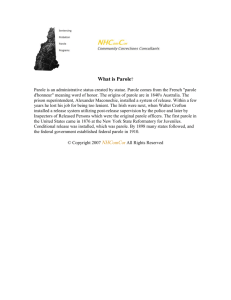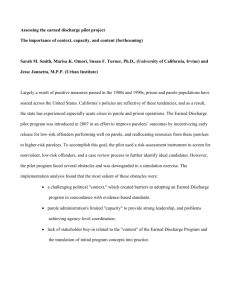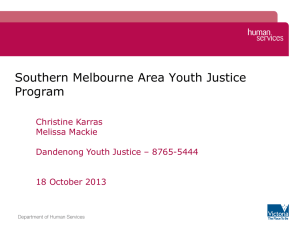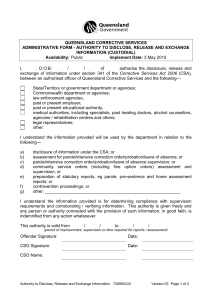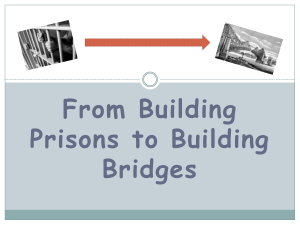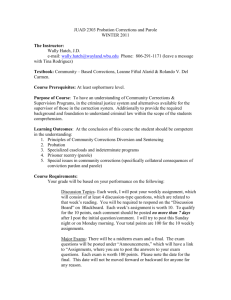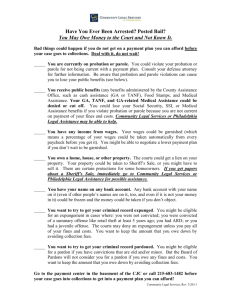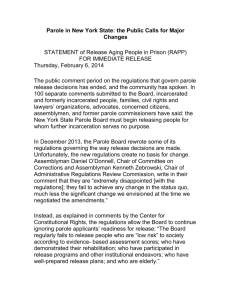Post Release
advertisement
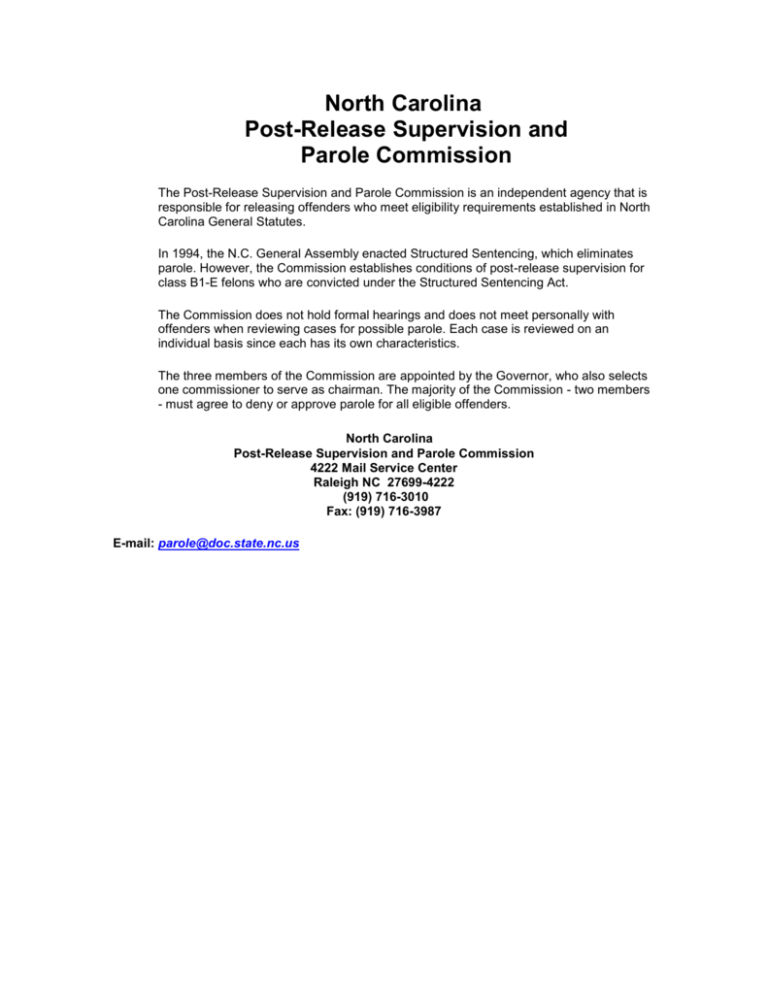
North Carolina Post-Release Supervision and Parole Commission The Post-Release Supervision and Parole Commission is an independent agency that is responsible for releasing offenders who meet eligibility requirements established in North Carolina General Statutes. In 1994, the N.C. General Assembly enacted Structured Sentencing, which eliminates parole. However, the Commission establishes conditions of post-release supervision for class B1-E felons who are convicted under the Structured Sentencing Act. The Commission does not hold formal hearings and does not meet personally with offenders when reviewing cases for possible parole. Each case is reviewed on an individual basis since each has its own characteristics. The three members of the Commission are appointed by the Governor, who also selects one commissioner to serve as chairman. The majority of the Commission - two members - must agree to deny or approve parole for all eligible offenders. North Carolina Post-Release Supervision and Parole Commission 4222 Mail Service Center Raleigh NC 27699-4222 (919) 716-3010 Fax: (919) 716-3987 E-mail: parole@doc.state.nc.us Post-Release Supervision and Parole Commission Mission Statement The mission of the Post-Release Supervision and Parole Commission is to protect the safety and welfare of the state's citizens. In cases where the Commission has discretionary release authority, this mission is accomplished through thorough analyses to determine when and under what circumstances it is in society's best interests to allow an offender to be released from prison and serve a portion of the sentence under supervision in the community. In cases where the Commission does not have discretionary release authority, this mission is accomplished through establishing conditions of supervision and an aftercare program that will enhance the probability that the offender will be successfully reintegrated back into the community. Responsibilities The Commission is committed to the philosophy that it is in the public's best interest to prepare offenders for release and to provide close constructive supervision for that portion of their sentences served in the community. To this end, the Commission has the following goals and responsibilities: To participate in identifying prison programs that will prepare the offender to re-enter society through a well-planned aftercare program. To establish conditions of supervision that provide control and rehabilitation by utilizing agency and community resources as a bridge to help the offender reach self-sufficiency and law-abiding citizenship. To monitor offenders compliance with supervision and to take appropriate action such as modification of conditions or revocation when warranted. To protect victims rights by providing accurate information, timely notification and encouraging input for the Commission's consideration. Myths and Truths about the Parole Process Myth: The Parole Commission meets as a group in a formal hearing to decide whether an offender should be paroled. Truth: The commissioners conduct an individual review of the offender's file and vote independently. Myth: Offenders apply for or request parole. Truth: Inmates become eligible for parole according to governing laws at the time of the offense. Myth: The Governor can overturn the Parole Commission's decisions. Truth: The Commission has exclusive authority in parole matters. There is no appeal process. Myth: The Parole Commission meets face to face with the offender during the parole review process. Truth: The Commission does not meet with the offender. Parole decisions are based on information in offenders' case files that was requested and/or received, information from the Division of Prisons, and views of victims, family members, and any other interested parties. Myth: Commissioners place incarcerated offenders in community based programs (work release, home leaves, etc.) Truth: The Commission has no jurisdiction over the placement of offenders in communitybased programs while they are incarcerated. The Commission gives final approval for work release placement in Life sentence cases, but takes action only after receiving a recommendation from the Division of Prisons. Myth: All of the Commissioners must agree to deny or approve parole for offenders. Truth: The majority of the Commission - two members - must agree to deny or approve parole for all eligible offenders. Myth: The Commission doesn't have to review cases every year. Truth: Once an offender has met parole eligibility requirements, the Commission must review the case at a minimum of once per year. Post-Release Supervision and Parole Commission Victim Services The North Carolina Post-Release Supervision and Parole Commission is dedicated in its effort to provide information to victims. Most victims are interested in how they can be aware of and involved in the parole review process. The first step is to request notification. Many victims' names and addresses are sent to the Commission from District Attorneys' offices to be listed for notification of parole investigation or parole denial. The Commission also attempts to locate and contact any victim of an assaultive crime. If an inmate has been reviewed for parole and the victim in the case did not receive notification then the victim is either not listed for notification or the Commission has an outdated address. Any victim who would like to be notified must submit a written request for notification of pending investigations or decisions in a case. Victims who are unsure if they are listed for notification should contact the commission at (919) 716-3010. It is very important for victims who wish to receive notification to contact the Commission of any address change so the notification data will remain accurate. Victims may also be involved in the parole review process by submitting their opinions to the Commission concerning an upcoming parole review. There are two ways a victim may communicate with the Commission: 1. Victims may express their opinions about a case in writing at any time. They may also request that certain conditions be imposed on the offender upon release onto supervision. The letters are included in the inmate's file and the Commissioners take the letters into consideration during the decision-making process. Mailing address: NC Post Release Supervision and Parole Commission 4222 Mail Service Center Raleigh NC 27699-4222 E-mail: parole@doc.state.nc.us 2. Victims of violent or assaultive crimes whose offenders are in medium or minimum custody have the opportunity to appear before the Commission in Raleigh to present information they feel is important for the Parole Commissioners to hear. The meetings are held once a week, are 30 minutes each and are limited to five persons per scheduled appointment. There is a limited number of appointments available and they are scheduled on a first-come first-serve basis. To request a meeting, call the Commission at 919-716-3010. Post-Release Supervision and Parole Commission The Parole Process Parole is the conditional release of an offender to supervision prior to the expiration of the sentence. An offender must be parole eligible before consideration can be given. Eligibility is established by North Carolina general statute. Those offenders whose crimes were committed prior to October 1, 1994 may be eligible for parole although offenders with certain types of sentences, such as sentences of special probation and those serving sentences for health law violations, cannot qualify. When a parole eligible offender enters the prison system, information is obtained which allows the Commission to obtain as much background information as possible. Obtaining the official crime version and determining the victims of crimes are examples of information obtained. When an offender becomes eligible for parole, all available information on the offender's case is reviewed to determine if the offender should be denied parole or investigated for parole. All parole decisions require the majority vote of the Commission. Some of the factors considered by the Commission include the nature and circumstances of the crime, the previous criminal record, prison conduct, prison program participation, input from court officials, victims, and other interested parties. If the Commission does not feel that the offender is parole ready, the offender is denied parole and reasons are furnished to the offender for the decision made. The reasons for parole denial are considered confidential but any persons who have expressed an interest in being notified of the Commission's decision are notified that the offender was denied and when the next parole review will occur. An offender must be reviewed at least once per year after becoming eligible for parole. If the Commission determines that the case warrants further consideration, a parole investigation is initiated. During a parole investigation, additional information is obtained which could include the offender's release plans, views of law enforcement and court officials, and views of any interested parties. During the investigation, notifications of parole investigation are sent to anyone who has expressed an interest in notification. Any parties are encouraged to provide any information for the Commission's consideration. Should the Commission determine that parole should be approved, notification of the decision will again be sent to interested parties. For those felony offenders who were convicted under the Fair Sentencing Law (crimes occurred between July 1, 1981 and September 30, 1994) and received a term of eighteen (18) months or greater, these offenders, in addition to otherwise possibly qualifying for parole consideration, must be granted a 90 Day Mandatory Parole at the end of the felony term. The Parole Commission does not have discretionary review authority for this type of parole but anyone who has expressed an interest in notification will receive notice prior to the parole of the offender on this type of parole. Parole Commission Review Process Page 2 Processing Structured Sentencing Cases Parole, as it previously existed, was eliminated under the Structured Sentencing Act for crimes committed on or after October 1, 1994. The Structured Sentencing Act mandates that the offender serve at least 100% of the minimum sentence and 85% of the maximum sentence. Once offenders with felony B1-E class convictions have served their required time, they are released on post-release supervision. Offenders with felony F-I class convictions are released from the prison system with no community supervision. The Parole Commission has no decision making power as to the offender's time of release under Structured Sentencing, however it sets conditions for the period of post-release supervision.

